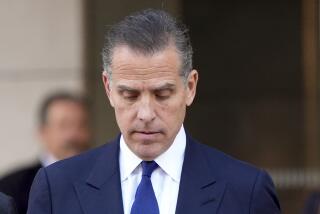BCCI Enters Guilty Plea but Judge Delays Accepting It : Banking: U.S. court says decision will be made after studying creditors’ objections as well as the settlement in the racketeering case.
- Share via
WASHINGTON — The Bank of Credit & Commerce International formally pleaded guilty Thursday to sweeping charges of racketeering, fraud and conspiracy but the federal judge presiding over the case reserved a decision on whether to accept the plea agreement.
U.S. District Judge Joyce Hens Green said that she will announce Jan. 24 whether to accept the plea agreement after considering objections from BCCI creditors and reviewing the settlement, which calls for the forfeiture of $550 million in U.S.-based assets.
The proposed penalty would be the largest criminal forfeiture in U.S. history.
Ira Raphaelson, the Justice Department’s special counsel for financial crimes, said that the plea agreement with the scandal-scarred bank represents “a fair, just and appropriate resolution” to the world’s biggest bank fraud case ever.
BCCI’s operations were shut down July 5 by the United States, Britain and other countries amid charges of widespread fraud. Depositor losses worldwide have been estimated at more than $15 billion. The bank has been linked to drug and arms deals, and money laundering.
Raphaelson said that criminal investigations would continue against individuals connected with BCCI all over the world. Indictments already have been obtained against BCCI founder Agha Hasan Abedi, former bank president Swaleh Naqvi and Saudi Arabian financier Ghaith R. Pharaon, among others. They have denied any wrongdoing.
Pharaon allegedly helped BCCI gain secret control of Independence Bank of Encino and the National Bank of Georgia. Those purchases are described as racketeering transactions in the plea agreement. It is illegal for foreign banks to acquire American banks without approval of U.S. regulators.
The guilty plea was entered by London attorney Brian Smouha, one of BCCI’s court-appointed liquidators. Smouha, Raphaelson and other lawyers explained portions of the 53-page plea agreement during a two-hour court hearing.
Justice Department officials disclosed the charges and their proposed settlement Dec. 19. Since then some creditors and foreign liquidators of BCCI have objected to the pact. The creditors argued that they were not consulted in the negotiations that led to the agreement.
On Wednesday, in New York, U.S. Bankruptcy Judge James Garrity denied a motion by foreign creditors who were seeking to block the agreement on grounds that it would impede their ability to collect money owed to them. The Justice Department argued that the creditors, including Panama, the Bank of India and Lloyds of London, were barred by law from intervening in its criminal case.
Judge Green, however, said that she would give creditors until Jan. 15 to file legal papers with her.
Under the plea agreement, $275 million forfeited by BCCI would go into a worldwide fund to pay creditors, depositors and others who are pursuing claims against the rogue institution.
Officials stressed that no funds would be paid to any BCCI customers who have been charged with hiding criminal proceeds, such as Latin American drug dealers, or Manuel A. Noriega, the ousted dictator of Panama, who is currently on trial in the United States for drug smuggling.
The forfeiture also will provide up to $275 million for Independence Bank and for First American Bank of Washington, which the Federal Reserve Board has charged was secretly and illegally controlled by BCCI. Former First American Chairman Clark R. Clifford and Robert A. Altman, its former president, have denied knowledge of such control and their conduct is still under investigation.
BCCI has not been accused of looting Independence or First American but both banks have suffered financially from bad real estate loans and negative publicity about their connection to the Luxembourg-based bank.
Raphaelson told the court that the plea agreement also would give the U.S. government access to BCCI records in foreign countries, a further aid to investigators. The comprehensive agreement was endorsed by 19 law enforcement officials, including Justice Department lawyers, heads of banking agencies and Robert M. Morgenthau, the New York district attorney who brought the first BCCI indictments last year.
More to Read
Inside the business of entertainment
The Wide Shot brings you news, analysis and insights on everything from streaming wars to production — and what it all means for the future.
You may occasionally receive promotional content from the Los Angeles Times.










